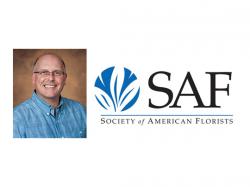SAF Convention: University Of Florida Professor Receives SAF Gold Medal Award
August 19, 2014 | 3 min to read

ALEXANDRIA, Va. — Over the last decade, gardening enthusiasts have become enchanted by an increasing variety of coleus available on the market, and for the bounty of gorgeous colors, compact shapes and unexpected patterns. They have one man to thank: David Clark, Ph.D. A professor in the University of Florida’s Department of Environmental Horticulture, Clark is the 2014 recipient of the Society of American Florists’ (SAF) Gold Medal Award.
The award honors the originator or introducer of a widely distributed plant or flower that has become established as an outstanding product of significant horticultural and commercial value. It was presented in Marco Island, Fla., on Aug. 16 during SAF’s 130th Annual Convention.
SAF Awards Committee member Marvin Miller, Ph.D., AAF, of Ball Horticultural Co. in West Chicago, Ill., presented the award in recognition of Clark’s groundbreaking research “improving the quality, color and variety of coleus and for generating consumer enthusiasm for the plant.”
Innovative Research, Practical Applications: David Clark, Ph.D.
Clark is widely known and respected for his innovative work in both basic and applied plant science, and for his ability to take new technologies to the consumer marketplace. Since starting his work with coleus 11 years ago, Clark has nearly eliminated early flowering and introduced new colors, color combinations and leaf shapes. In addition, he’s made varieties more tolerant of heat, drought and sun exposure.
“[Clark has] produced a hassle-proof plant — one anyone can grow, from growers to consumers,” said former SAF president Terril Nell, Ph.D., AAF, co-author of SAF’s Flower & Plant Care manual and professor emeritus of floriculture at the University of Florida. “[He’s responsible for] varieties so tough that you essentially stick them in the ground and water them when you can and they last all season, anywhere in the country.”
Because of Clark, UF has patented 19 cultivars, trademarked nine cultivars and released 49 cultivars to the commercial floriculture industry, and cultivars bred in this program are now sold in the U.S., Canada, Europe and Japan. So far, 13 of the cultivars he developed have sold 500,000 cuttings or more in the U.S. Many of the cultivars have been recognized as “Best in Show” at university bedding plant trials and both trade and consumer publications have heralded Clark’s work, including Greenhouse Grower, Better Homes and Gardens and Southern Living.
Clark has been with UF since 1995. There, he established the Floriculture Biotechnology and Genetics laboratory in the Environmental Horticulture Department. His research group conducts experiments focused on developing flowers and plants that have maximum sensory appeal to humans. He has been instrumental in identifying the gene responsible for fragrance in flowers. Clark also founded the UF Institute for Plant Innovation, a multidisciplinary group that has established the concept of using “Consumer Assisted Selection” for developing new plants for future consumers.
Clark’s academic group is widely recognized as a leading force focusing on the genetic improvement of floral crops. In the basic science arena, his group was the first to produce genetically engineered plants with flowers lasting twice as long as the previous standard. Building on that success, his lab has engineered plants to produce larger flowers, with leaves that remain green longer and enhanced fragrance. He has been instrumental in introducing junior- and senior-level students to scientific research in his lab. Many of these students have received Howard Hughes Scholarships to advance their academic careers.
His work in functional genomics has led to the development of the largest publicly available DNA sequence database in the world for his model species petunia. Clark has expanded his research group to include an applied focus on tropical plants, developing a conventional breeding program for the production of new varieties.
Source: The Society of American Florists
